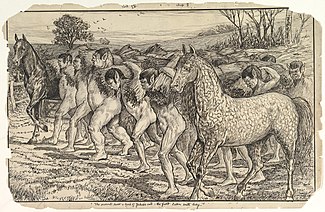
Friday
Even as U.S. coronavirus cases went over the 2 million mark, resulting in over 115,000 deaths and counting, many Americans were dispensing with masks, a case of hope triumphing over experience (as Samuel Johnson once observed about second marriages). It’s not just hope, however. Desensitization is necessary to tolerate such numbers: humans have an amazing ability to normalize death, as Jonathan Swift makes clear in Book IV of Gulliver’s Travels.
People have found various ways to rationalize Covid deaths. When nursing home residents die, well, they were close to death anyway. When prisoners die, well, they shouldn’t have done the bad things that sent them to prison. When meat packers die, well, who are these people anyway? When doctors and nurses die, well, they are heroes we should applaud for making the ultimate sacrifice to bring the country back.
Meanwhile we learn that, if we had addressed the virus earlier, tens of thousands of these people would be alive today. Similarly, if we ignore the CDC’s continuing recommendations regarding masks and social distancing, tens of thousands more people will get sick and die who don’t have to.
Swift’s most famous lethally insensitive individual is the Modest Proposer, who advocates eating babies to solve Ireland’s financial woes. The Proposer, however, at least claims to be operating out of general benevolence. The Gulliver’s Travels passage I have in mind is more chilling because Gulliver engages in Hannibal Lector-type behavior without even noticing it.
If we the readers aren’t alert, we miss it as well.
In the final book, Swift’s protagonist has fallen in love the Houyhnhnms and, at the same time, adopted their view of Yahoos as vermin worthy of extermination. Although he eventually must admit that he himself is a Yahoo, he regards his fellow creatures as nothing more than raw materials for a boat he is building:
I finished a sort of Indian canoe, but much larger, covering it with the skins of Yahoos, well stitched together with hempen threads of my own making. My sail was likewise composed of the skins of the same animal; but I made use of the youngest I could get, the older being too tough and thick; and I likewise provided myself with four paddles. I laid in a stock of boiled flesh, of rabbits and fowls, and took with me two vessels, one filled with milk and the other with water.
I tried my canoe in a large pond, near my master’s house, and then corrected in it what was amiss; stopping all the chinks with Yahoos’ tallow, till I found it staunch, and able to bear me and my freight; and, when it was as complete as I could possibly make it, I had it drawn on a carriage very gently by Yahoos to the sea-side, under the conduct of the sorrel nag and another servant.
In other words, he uses the hides of adult humans for the outer shell, human baby skin for the sails, and human fat to stop the chinks. One is reminded of how Nazis also mined their victims, using skin for lampshades, bones for fertilizer, and hair for mattress stuffing.
The horror of Swift’s scene lies in Gulliver’s lack of horror. The horror in our own situation lies is how many, starting with the president, shrug off the highest death toll in the world. We may not be stripping our front line workers of their hides, but we’re equally callous about their well-being.
Again, many of these living, vibrant, complex and worthy human beings did not—and do not—have to die. An intelligent and concerted response could still save tens of thousands of lives. If we simply write them off as the cost of doing business, then God help us all.